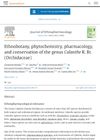 10 citations,
July 2022 in “Journal of Medicinal Chemistry”
10 citations,
July 2022 in “Journal of Medicinal Chemistry” Adding a second method to PROTACs could improve cancer treatment.
[object Object]  6 citations,
November 2021 in “Journal of Ethnopharmacology”
6 citations,
November 2021 in “Journal of Ethnopharmacology” Calanthe orchids have medicinal potential and contain 265 chemical compounds, but are underexplored.
 4 citations,
October 2022 in “Microbial Cell Factories”
4 citations,
October 2022 in “Microbial Cell Factories” Certain bacteria from the Citrullus colocynthis plant may be a new source of antibiotics to fight drug-resistant diseases.
 October 2024 in “International Journal of Ayurveda Research”
October 2024 in “International Journal of Ayurveda Research” Emblica officinalis and Eclipta alba may help treat hair loss naturally.
 43 citations,
July 2013 in “Pharmacological reviews”
43 citations,
July 2013 in “Pharmacological reviews” New research on prostamide F2α has led to treatments for glaucoma and eyelash growth and may have more medical uses.
 83 citations,
July 2008 in “Current Opinion in Chemical Biology”
83 citations,
July 2008 in “Current Opinion in Chemical Biology” The document concludes that understanding sulfation biology is crucial for creating treatments due to its importance in biological functions and disease.
 46 citations,
September 2011 in “Journal of Endocrinology”
46 citations,
September 2011 in “Journal of Endocrinology” Natural 5α-reduced glucocorticoids might be anti-inflammatory with fewer side effects than current options.
 581 citations,
February 1998 in “The American Journal of Medicine”
581 citations,
February 1998 in “The American Journal of Medicine” Herbal remedies can cause adverse effects and need more safety research.
 149 citations,
April 2004 in “Journal of Dermatological Science”
149 citations,
April 2004 in “Journal of Dermatological Science” Minoxidil boosts hair growth by increasing cell production and survival.
 65 citations,
November 2004 in “Journal of the American Academy of Dermatology”
65 citations,
November 2004 in “Journal of the American Academy of Dermatology” Bimatoprost can cause excessive eyelash growth.
 42 citations,
March 2006 in “Drug Discovery Today: Therapeutic Strategies”
42 citations,
March 2006 in “Drug Discovery Today: Therapeutic Strategies” The conclusion is that we need more effective hair loss treatments than the current ones, and these could include new drugs, gene and stem cell therapy, hormones, and scalp cooling, but they all need thorough safety testing.
 32 citations,
January 2021 in “Molecules”
32 citations,
January 2021 in “Molecules” Some Middle Eastern plants may help treat diabetes and could be alternatives to current drugs, but more research is needed.
 22 citations,
November 2018 in “Breast Cancer Research and Treatment”
22 citations,
November 2018 in “Breast Cancer Research and Treatment” The medications 5α-reductase inhibitors and spironolactone are generally safe for breast cancer patients on endocrine therapies and do not significantly increase breast cancer risk.
 10 citations,
June 2018 in “Aaps Pharmscitech”
10 citations,
June 2018 in “Aaps Pharmscitech” The flutamide-loaded hydrogel is a promising, skin-friendly treatment for acne and hair loss, potentially requiring less frequent application.
 7 citations,
January 2010 in “Pharmacognosy Research”
7 citations,
January 2010 in “Pharmacognosy Research” The tobacco leaf extract may help hair grow and could treat hair loss.
 5 citations,
February 2011 in “Expert Opinion on Drug Discovery”
5 citations,
February 2011 in “Expert Opinion on Drug Discovery” We need better treatments for hair loss, and while test-tube methods are helpful, they can't fully replace animal tests for evaluating new hair growth treatments.
 4 citations,
February 2017 in “Journal of Cutaneous Medicine and Surgery”
4 citations,
February 2017 in “Journal of Cutaneous Medicine and Surgery” Compounds from certain trees used by First Nations people show potential for treating skin conditions and promoting hair growth, but more research is needed to confirm their safety and effectiveness.
 3 citations,
April 2010 in “Journal of Receptors and Signal Transduction”
3 citations,
April 2010 in “Journal of Receptors and Signal Transduction” Minoxidil, a common alopecia medication, might cause eye changes due to its properties and lack of tissue selectivity.
 1 citations,
March 1997 in “Journal of Chromatography B: Biomedical Sciences and Applications”
1 citations,
March 1997 in “Journal of Chromatography B: Biomedical Sciences and Applications” Researchers developed a method to measure different forms of a drug that could help treat prostate issues and hair loss, and found how these forms behave in animals.
 April 2023 in “International journal of pharmaceutical sciences review and research”
April 2023 in “International journal of pharmaceutical sciences review and research” The F2 Emulgel with Tridax procumbens extract showed good physical properties and antimicrobial effectiveness for wound healing.
 April 2023 in “International journal of pharmaceutical sciences review and research”
April 2023 in “International journal of pharmaceutical sciences review and research” The F2 Emulgel with Tridax procumbens extract showed the best qualities for healing wounds.
 54 citations,
August 2005 in “Alcohol”
54 citations,
August 2005 in “Alcohol” Finasteride affects alcohol intake in male mice, possibly due to neurosteroids.
 42 citations,
February 2021 in “Signal Transduction and Targeted Therapy”
42 citations,
February 2021 in “Signal Transduction and Targeted Therapy” Hair follicle regeneration possible, more research needed.
 35 citations,
May 2020 in “Frontiers in Pharmacology”
35 citations,
May 2020 in “Frontiers in Pharmacology” Different drugs for prostate-related urinary symptoms work but have various side effects, and treatment should be tailored to the individual.
[object Object]  24 citations,
August 2018 in “Journal of Ayurvedic and herbal medicine”
24 citations,
August 2018 in “Journal of Ayurvedic and herbal medicine” Hibiscus rosa-sinensis may help treat various health issues and promote hair growth, but more research is needed for safety.
 16 citations,
July 2002 in “JOGC/Journal of obstetrics and gynaecology Canada”
16 citations,
July 2002 in “JOGC/Journal of obstetrics and gynaecology Canada” Birth control pills can help reduce mild to moderate acne in women.
 3 citations,
February 2015 in “Scientific Research and Essays”
3 citations,
February 2015 in “Scientific Research and Essays” The study showed that brown planaria can be used to cheaply test if local plants can stop cell growth.
 1 citations,
August 2020 in “IntechOpen eBooks”
1 citations,
August 2020 in “IntechOpen eBooks” Old drugs like finasteride and spironolactone are being successfully used for hair loss and skin conditions, and many other drugs show promise for new uses in dermatology.
 1 citations,
January 2017 in “Expert opinion on orphan drugs”
1 citations,
January 2017 in “Expert opinion on orphan drugs” Adalimumab is the most effective treatment for severe hidradenitis suppurativa, but more research is needed to improve treatment options.
 April 2024 in “Frontiers in pharmacology”
April 2024 in “Frontiers in pharmacology” Cynoglossum amabile has medicinal potential but poses safety concerns due to liver toxicity.






























